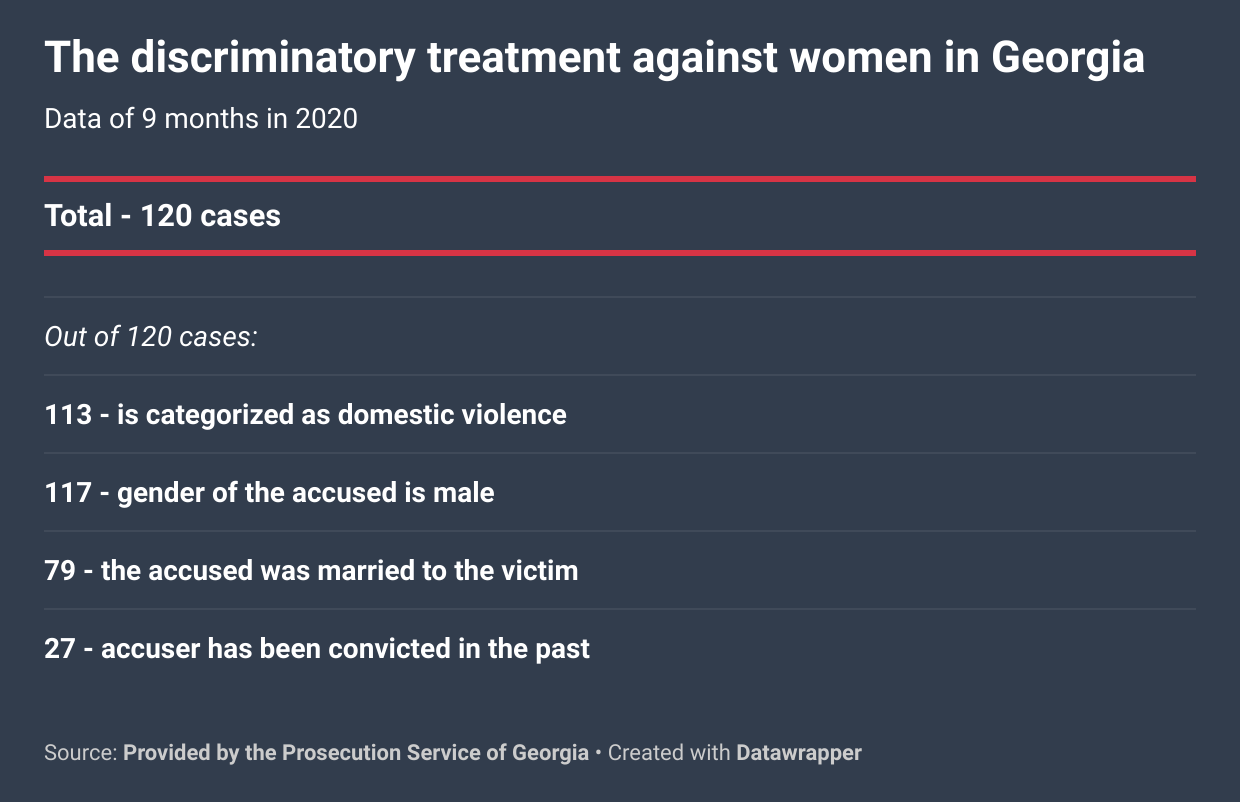By Nino Apakidze
According to the Prosecutor's office, 23 women were murdered during the year 2020 in Georgia, up from 19 recorded cases in 2019. Perpetrators were male in 20 of the cases in 2020, the year when the motive for gender discrimination began to be identified as femicide in Georgia. This development will hopefully contribute to the establishment of a gender-sensitive criminal justice system, where crimes committed against women are properly recognized, qualified, and punished and the prevention of femicide, according to the Georgian Young Lawyers Association (GYLA).
Femicide, killing women and girls because of their gender, is a growing issue globally and significantly impacts the lives of women and girls worldwide. It is present regardless of social class and educational background. The Convention on Preventing and Combating Violence Against Women and Domestic Violence states that violence against women is a manifestation of historically unequal power relations between the sexes. The document outlines the structural nature of violence, which is “one of the crucial social mechanisms by which women are forced into a subordinate position compared to men”.
When investigating femicide, special attention is paid to investigating the history of gender-based violence and domestic violence experienced by the victim, since femicide is often the culmination of systematic and cyclical violence that women experience before their murder, according to the Human Rights Education and Monitoring Center in a recent report on femicide cases in Georgia. Systematic violence has several characteristics. The World Health Organization defines the risk and protective factors identified while investigating the statistics of gender-based violence. The perpetrator’s unemployment, gun ownership, problematic alcohol use, mental health problems, habitually using force for sexual intercourse, prior intimate partner abuse history, and a belief in gender inequality-- all serve as frequent risk factors of femicide.
There were 120 cases of discrimination against women identified by the Georgian General Prosecutor for 2019, the same number as the first nine-months of 2020. The number of violent cases also increased compared to 2018, when 110 cases of gender based and family violence cases were identified. The Georgian Prosecutor’s data reveals several risk factors of discrimination against women.

The motive of gender discrimination in a femicide case was identified for the first time in Georgia in 2020. Despite some progress related to obtaining data on femicide, compared to previous years, GYLA reported that “All prevention activity carried out by the Georgian government is largely chaotic and unsystematic, which reduces the effectiveness of prevention work.”
According to GYLA, investigative bodies and the court must have appropriate knowledge and a clear vision of what should be considered as a gender motive in each case. To prevent crimes against women, WHO outlines several protective factors against femicide. On an individual level, having a university education, a job, and separate housing serve as protection. From the societal, structural level, important measures for prevention include more police investigation, legislation restricting access to firearms for perpetrators, mandated arrests for violation of restraining orders, and gender-sensitive legislation.
According to the report conducted by the Institute for the Development of Freedom of Information, after Georgia ratified the Istanbul Convention (The Council of Europe Convention on preventing and combating violence against women and domestic violence), important changes were made to Georgian domestic legislation in order to harmonize it with the convention:
However, some other requirements of the Istanbul Convention still remain unfulfilled. GYLA has called on the Georgian government to criminalize forced abortion, an obligation stipulated by the convention. According to recent changes in the Criminal Code of Georgia, for several crimes against life and health the qualifications of gender-related circumstances were defined:
Tatia Kinkladze, lawyer of the non-governmental organization International Society for Fair Elections and Democracy stated that, in spite of some positive changes, Georgian law still doesn’t recognize femicide as a separate crime. Despite the definition of qualifying circumstances for certain crimes, the ‘gender motive’ is not included in statistics produced by the Internal Ministry of Georgia.
“In certain cases, the state agencies haven’t developed any specific criteria for gender statistical analysis, therefore the factors leading to increased violence against women or femicide are not analyzed. Those factors are important circumstances that need to be studied in order to prevent violence against women.”
A gender researcher, Tatia Akhalaia, outlined the problems obtaining data on femicide in Georgia: “We, the organizations, often classify a crime as, for example, femicide. The fact that it is difficult to obtain statistical information complicates the case even in the field of advocacy. When we organize trainings and discussions, we use the papers and reports prepared by non-governmental organizations, since reliable public information from state structures is not available.”
According to the Council of Europe’s Convention on preventing and combating violence against women and domestic violence, as a signatory of this international treaty, Georgia has a responsibility to support research into all forms of violence within the scope of the Convention, and to establish effective co-operation with non-governmental organizations. Despite some positive changes in legislation, GYLA attributes the increased number of femicide cases as being due to weaknesses in state policy on preventive measures in gender-related crimes.
Obtaining accurate data and statistics of violence against women, and learning the root causes of these forms of violence in order to identify risk and protective factors, are key concerns of Georgian non-governmental organizations, journalists, and researchers.